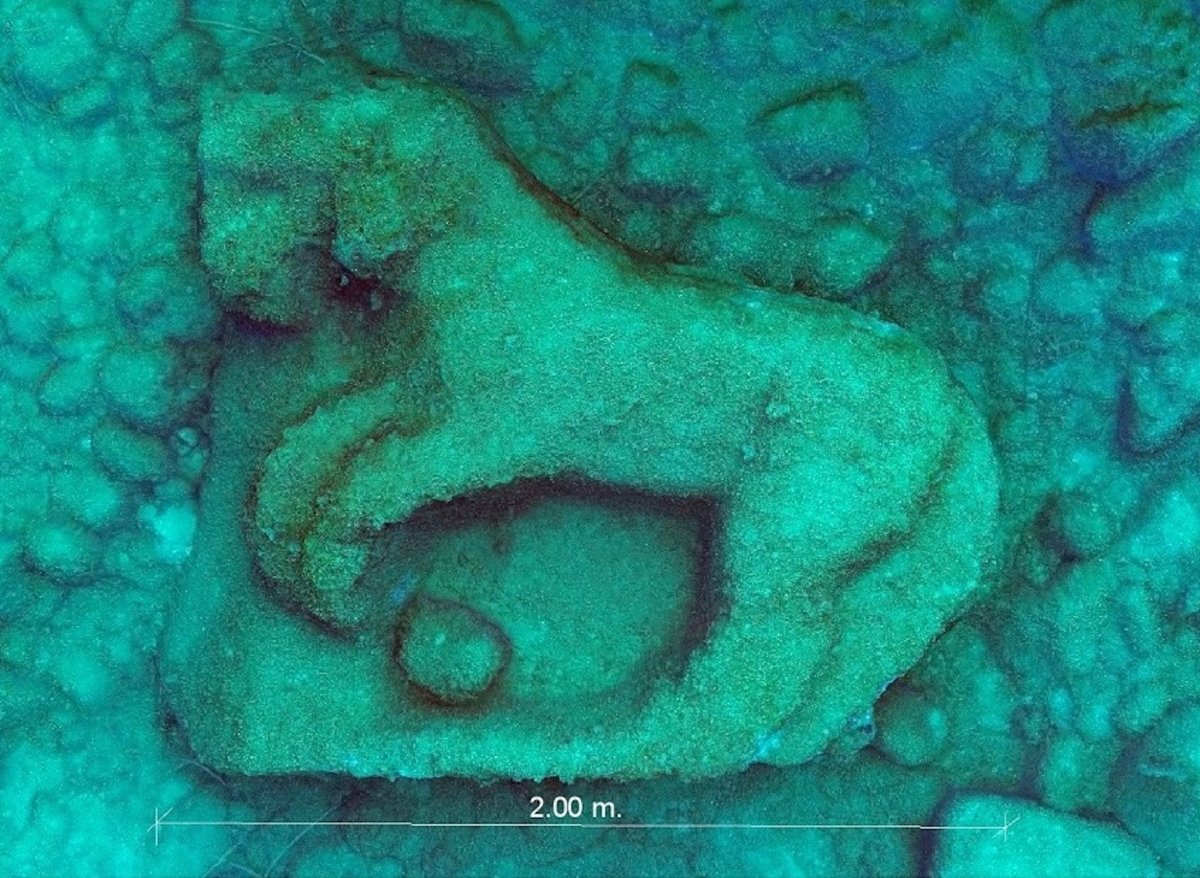Divers have recovered an "exceptional" marble relic from the sea bed in Italian waters that may belong to a famous temple dedicated to the ancient Greek deity, Zeus, who was believed to rule as king of the gods.
The stone relief, which depicts a prancing horse, was located near the mouth of the Akragas River off the coast of San Leone—a town on the southern coast of Sicily, the largest and most populous island in the Mediterranean Sea. One of Italy's 20 regions, the island is located just off the "toe" of the country's "boot."
Sicily was first settled by ancient Greek colonists in the 8th century B.C., although the island was eventually conquered by the Romans in the 3rd century B.C.
Earlier this month, a team including divers from the Superintendency of the Sea for the region of Sicily, the cultural heritage protection unit of the Italian Carabinieri (one of the country's main law enforcement agencies) and the nonprofit, volunteer organization BCsicilia recovered the marble relic, according to a statement.
While more research needs to be conducted to uncover the true nature of the find, experts believe it may have been designed as decoration for the Temple of Olympian Zeus in Agrigento—a hilltop city in Sicily located slightly inland from San Leone.
"If, after cleaning and restoration, the hypothesis that it is a frieze of the temple of Zeus is confirmed, it would be the greatest discovery of the last hundred years in the archaeological history of Agrigento," Alfonso Lo Cascio, regional President of BCsicilia, told Newsweek.
Agrigento is known for the ruins of the Akragas, an ancient city that was founded in the 6th century B.C. by Greek colonists. Akragas was an important city of Magna Graecia—a name the Romans used to refer to the coastal areas of southern Italy that were inhabited by Greek speakers. The settlement was nicknamed "the most beautiful city of mortals" by the ancient Greek poet Pindar.
Akragas is renowned for the Valley of the Temples archaeological site, which contains well-preserved ancient Greek temples. These include the Temple of Olympian Zeus—the largest temple ever constructed in the Doric architectural style, although it was never fully completed and now lies in ruins.

While the structure of the original temple is still the subject of debate, it is thought to have measured around 66 feet high, 370 feet in length and 185 feet in width. Experts believe construction of the temple probably began around 480 B.C.
"The Temple of Olympian Zeus was out of the ordinary in size and historians of the time describe it as the largest Doric temple in the West," Lo Cascio said. "Its monumental altar, the remains of which are still found a short distance from the eastern front of the Temple, at the time of its construction was the largest altar in the entire Greek world."
The recently recovered artifact, which lay at a depth of around 30 feet in a spot located almost 1,000 feet from the coast, was known about for several years, but had been dismissed in previous archaeological surveys as a "tub" or "basin" of no significance. Low visibility in the water had obscured its true form.
This explanation had never convinced the BCsicilia Underwater Group led by Gaetano Lino, however. In October, 2022, Lino together with Salvatore Ferrara, also of the group, conducted a survey of the mysterious artifact, taking more than 200 images, in collaboration with Francesco Urso from the organization's headquarters.
Digitally stitching these images together enabled the BCsicilia team to create a 3D model of the artifact, revealing it to be a marble relief in the shape of a prancing horse, likely from the ancient Greek period. Horses like these were important symbols in ancient Greek iconography.
Following this "extraordinary discovery," BCsicilia reported the find to the Superintendency of the Sea, sparking efforts to recover the artifact.
The size and shape of the relief indicates that it may have been designed to fit in an architectural element known as a tympanum—a semi-circular or triangular decorative wall surface over an entrance, door or window—of a larger than normal temple situated in the "Valley." This was possibly the temple dedicated to Zeus in Agrigento, according to one hypothesis, although further research will be required to shed further light on this question.
As for how the relic ended up in the sea, Lo Cascio said the ship carrying it may have sunk in front of the mouth of the Akragas River, either on arrival or departure if linked to a case of plundering.
"After 16 months since the report of our underwater group, the exceptional marble relic has finally been recovered," Lo Cascio said in a statement. "Now we expect as soon as possible the cleaning, analysis and all the necessary investigations to determine the nature, era and destination of the great sculpture."
Do you have a tip on a science story that Newsweek should be covering? Do you have a question about archaeology? Let us know via science@newsweek.com.
Update 2/16/24, 12:41 p.m. ET: This article has been updated to include additional information about the BCsicilia Underwater Group.
Uncommon Knowledge
Newsweek is committed to challenging conventional wisdom and finding connections in the search for common ground.
Newsweek is committed to challenging conventional wisdom and finding connections in the search for common ground.
About the writer
Aristos is a Newsweek science reporter with the London, U.K., bureau. He reports on science and health topics, including; animal, ... Read more
To read how Newsweek uses AI as a newsroom tool, Click here.






